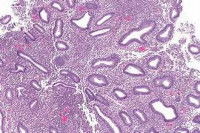Evaluation of Proliferative Potential of Musa Paradisiaca Stem Juice on the Pancreatic Cells of Wistar Rats http://www.doi.org/10.26538/tjnpr/v8i1.46
Main Article Content
Abstract
Musa paradisiaca commonly called plantain is a major part of human diet especially in West Africa. It is used as the main source of energy food for people with type 2 diabetes mellitus. The purpose of this study was to assess the ability of Musa paradisiaca stem juice to boost pancreatic cell proliferation in Wistar rats. Twenty-four adult Wistar rats were divided into four groups of six animals each. The first group (control) was administered normal saline, while groups 2 - 4 were administered 10, 20, and 30 mL/kg orally of plantain stem juice, respectively once daily for 21 days. The effect of plantain stem juice on body weight and haematological indices were evaluated. The cell proliferative and/or cytotoxic potential of the juice was assessed by the 3-(4,5-dimethylthiazol-2-yl)-2,5-diphenyl-2H-tetrazolium bromide (MTT) colorimetric assay. The effect on interleukin-4 was also evaluated using the enzyme-linked immunosorbent assay (ELISA). Administration of plantain juice resulted in a significant increase in the body weight of the rats. There was no significant effect on the haematological parameters except for an increase in white blood cell count. Plantain stem juice tends to increase pancreatic cell proliferation and improves the histomorphology of the pancreas after 21 days of administration. Therefore, Musa paradisiaca stem juice may serve as a protective agent against pancreatic cell damage or dysfunction.
Downloads
Article Details
Section

This work is licensed under a Creative Commons Attribution-NonCommercial-NoDerivatives 4.0 International License.
How to Cite
References
Dankyi AA, Dzomeku BM, Anno-Nyako FO, Adu-Appiah
A, Gyamera A. Plantain Production Practices in the
Ashanti, BrongAhafo and Eastern Regions in Ghana. Asia J
Agric Res. 2007; 1(1):1-9.
Oyebadejo SA, Joseph OS, Adesite SO, Omorilewa AO.
Effect of Citrus Limon Juice and Tamoxifen on the Tumour
growth mass Indices, Cell Proliferation, Cell Viability and
Cytogenetic (Mitotic Index) of Sprague Dawley Rats
Induced MCF-7 Breast Cancer Cells. Saudi J Biomed Res.
; 4(5):216-225.
Proestos C. The Benefits of Plant Extracts for Human
Health. Foods (Basel, Switzerland). 2020, 9(11), 1653.
Banful B, Hauser S, Ofori KO, Kumaga F. Nematodes and
weeds control effects of Pueraria phaseoloides and
Flemingia marcrophylla, fallow on establishment, survival
and yield of plantain. West Afr J Appl Ecol. 2009; 14(1):
-251.
Alan D. The Oxford Companion to Food. Oxford
Companions Series (3rd ed.). Tom Jaine (ed.). Oxford
University Press, 2014, 58 p.
Basavarajaiah BS and Mahadevappa P. Strength of
Materials, Second edition. CBS Publishers and Distributors,
Solomon IP, Oyebadejo SA, Ukpo EM, Joseph OS.
Changes in serum electrolyte, creatinine and urea of fresh
Citrus limon juice administered to growing rabbits
(Oryctolagus cuniculus). Int J Agric Sci Res. 2015;
(8):180-183.
Solomon IP, Oyebadejo SA, Ukpo EM, Joseph OS. Effect
of Fresh Citrus limon Juice on Liver Histomorphology of
Growing Rabbits (Oryctolagus cuniculus). Scholars J Agric
Vet Sci. 2015; 2(5):347-351.
Mohan KM. Joshi MC, Prabha, T, Dorababu M, Goel RK,.
Effect of plantain banana on gastric ulceration in NIDDM
rats: role of gastric mucosal glycoproteins, cell
proliferation, antioxidants and free radicals. Indian
J. Exp. Biol, 2006; 44(4), 292–299.
Ogunmoyole T, Johnson OD, & Yusuff AA. Ethanolic
Extract of Whole Unripe Plantain Musa paradisiaca
Ameliorates Carbon Tetrachloride-Induced Hepatotoxicity
and Nephrotoxicity in Wistar Rat. Annu. Res. Rev. 2021;
(12), 78-87.
Aldbass A, Amina M, Al Musayeib NM. Cytotoxic and
anti-excitotoxic effects of selected plant and algal extracts
using COMET and cell viability assays. Sci Rep. 2021; 11,
Crane JH and Balerdi CF. The Banana in Florida. Institute
of Food and Agricultural Science, 1998; HS 10.
Dzomeku BM, Armo-Annor F. Adjei-Gyan K, Ansah, J,
Nkakwa A, Darkey SK. On-farm evaluation and consumer
acceptability study of selected tetraploid Musa hybrid in
Ghana. J Plant Sci. 2008; 3(2):216-233.
Musa OS, Muhammed I, Abdullateef KA & Hussein
Oyelola BO. Protective Effects of Aqueous Extract of Bay
Leaf (Laurus Nobilis) on Endotoxin-Induced Oxidative
Stress in Rabbits. J. Herbs Spices Med. Plants. 2023; 29:1,
pages 52-62.
Engel N, Falodun A, Kühn J, Kragl U, Langer P, Nebe
B.Pro-apoptotic and anti-adhesive effects of four African
plant extracts on the breast cancer cell line MCF-7. BMC
CAM. 2014; 14, 1-13.
Engel N, Oppermann C, Falodun A, Kragl U. Proliferative
effects of five traditional Nigerian medicinal plant extracts
on human breast and bone cancer cell lines. J.
Ethnopharmacol. 2011; 137 (2), 1003-1010




